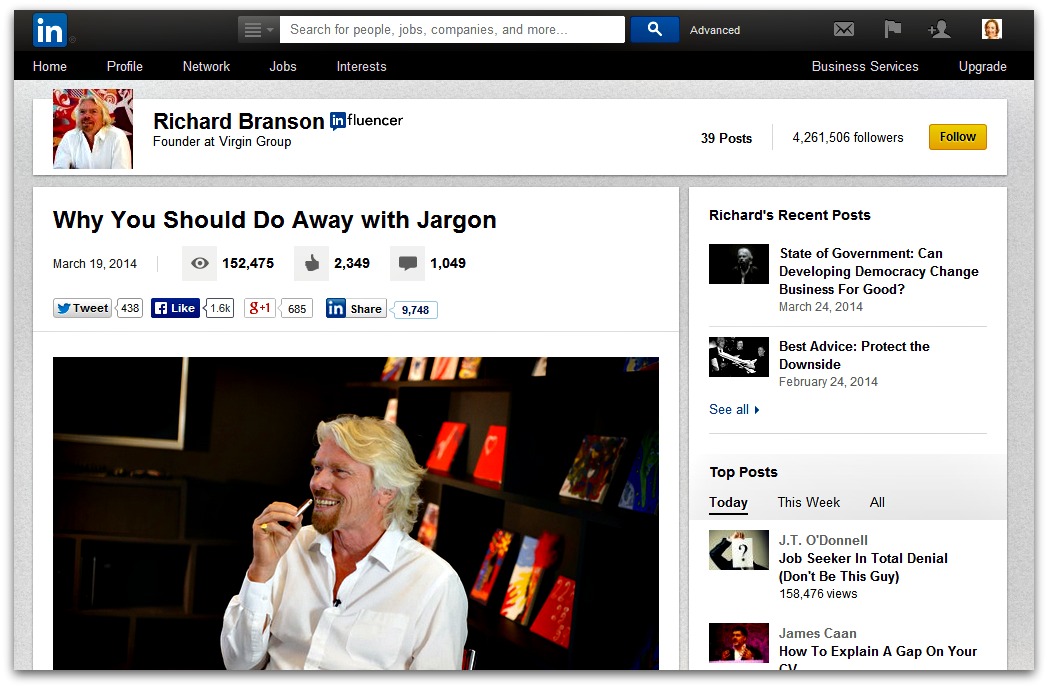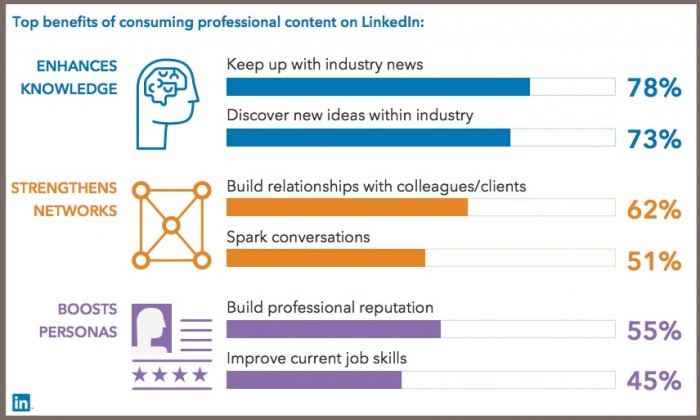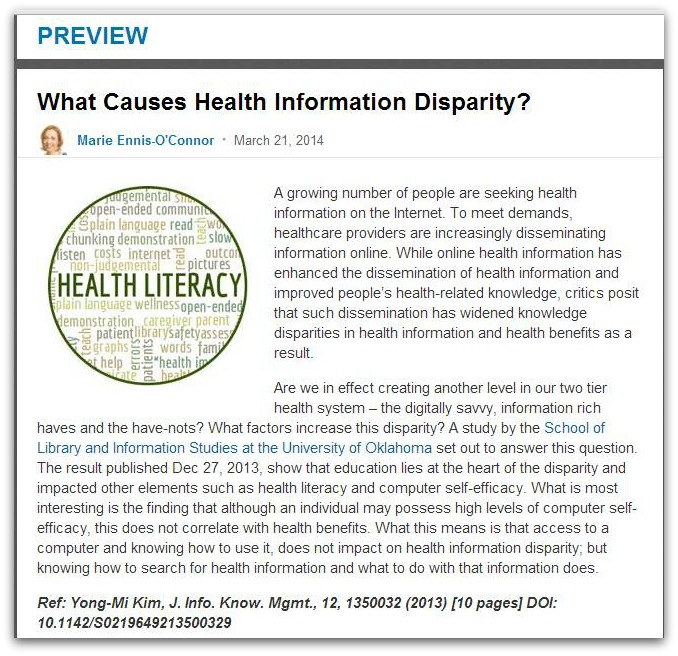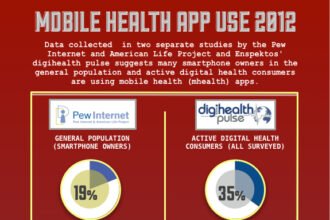
Are you on LinkedIn? Would you like to take your LinkedIn marketing to another level? If you answered yes, then today’s article is for you. I am going to show you how to build your healthcare brand on LinkedIn and become an influencer through content publishing.

Are you on LinkedIn? Would you like to take your LinkedIn marketing to another level? If you answered yes, then today’s article is for you. I am going to show you how to build your healthcare brand on LinkedIn and become an influencer through content publishing.
LinkedIn is one of the longest established players in the social media marketing world. It has been around since 2003 and boasts over 277 million users, 2.1 million groups and 3 million business pages. In October 2012, LinkedIn launched a publishing platform for what it calls “Influencers”. This group includes individuals like Sir Richard Branson, Bill Gates, and President Barack Obama. Last month LinkedIn opened its professional publishing platform to 25,000 members. It will roll out this service to more users over the coming months, evenutally allowing every user to publish articles on the platform.

Why did LinkedIn expand its publishing privileges?
LinkedIn wants to be more than just a repository for your resume. It wants to be a place for professionals to share insights. It also wants members to visit the site more often and stay longer. LinkedIn believes by publishing expert content created by members they can achieve this goal.
What this means for your healthcare marketing

You now have a platform to share your expertise, raise your profile, and strengthen your healthcare brand. Posts you publish will appear as part of your professional profile on your news feed. These can become a catalyst for creating dialogue within your professional network. Your network will be able to comment, like, and share your posts within their networks. LinkedIn members not in your immediate network can then follow, like, and share your influencer posts. And if enough people engage with your content, you could find it featured on other LinkedIn channels.
Optimize your LinkedIn Profile
Before you start publishing content on LinkedIn, optimize your profile. If readers are interested in your content, they will check out your profile; make sure it reflects your expertise and experience accurately.
Ask yourself the following questions.
- Is my LinkedIn profile accurate and up to date?
- Do I need to change my headline?
- Does my summary reflect what I want people to know about me?
- Have I included all my skills and expertise? Optimize your profile with relevant keywords so that you will show up in search results.
- Am I happy with my current profile image? Use a head shot which shows you in your best professional light.
Spending some time optimizing your profile before you start publishing will pay dividends.
Now you are ready to start writing content.
How to use LinkedIn’s publishing platform
 Once your ability to write long-form posts is activated, you will see a pencil icon on your LinkedIn homepage. Click the pencil to enter the “compose” screen. Now start writing, adding relevant images and links. It’s a good idea to preview your post before you publish. Check spellings, grammar and syntax. Pictured below is a screenshot of one of my recent posts in Preview mode.
Once your ability to write long-form posts is activated, you will see a pencil icon on your LinkedIn homepage. Click the pencil to enter the “compose” screen. Now start writing, adding relevant images and links. It’s a good idea to preview your post before you publish. Check spellings, grammar and syntax. Pictured below is a screenshot of one of my recent posts in Preview mode.

When you are happy with how your post looks you are ready to hit publish. Your post will then appear on your profile and is shared with your network – people who you’re connected to and members who just follow your posts. You’ll be able to monitor your post’s stats such as views, likes, and other metrics, and flag inappropriate comments. You can access your stats at any time from your profile page. You will also receive email reports on page views, likes, followers, and other performance metrics.
9 Steps to Becoming a Healthcare Influencer On LinkedIn
1. Write great content
To maximize the chances of LinkedIn’s algorithm identifying you as an influencer, you need to write content that is of value to your audience. Consider who your audience is – are they patients, doctors, nurses or other healthcare providers? What kind of content will be of benefit to them? Writing content that will resonate with your audience makes it more likely users will like and share your content.
Here are some more tips for writing great content on LinkedIn.
- Keep your content focused and professional.
- Avoid sales pitches.
- Share your professional expertise on topics you are most passionate about.
- Write about what’s topical in healthcare or share your thoughts on important trends.
- Share your most memorable experiences or challenges.
- Long form content performs better than short – aim for 1900 and 2000 words.
- Make the content easy to read – use bullet points, images and bold key content.
2. Write consistently
Writing one or two posts is not enough to give readers a comprehensive view of your expertise. Aim for a consistent writing schedule to increase your readership. Writing on a regular basis will boost your credibility, build a stronger profile, and increase the likelihood that members will follow you and your posts. Consistent activity on LinkedIn will affect distribution and influencer status. LinkedIn recommends publishing weekly – but it’s up to you to experiment with this and see what works. I’ve been testing it out by publishing daily posts and my LinkedIn follower number is steadily increasing.
3. Keep your titles short
Paul Shapiro analyzed 3,000 of LinkedIn’s most successful blog posts to gain insights into what makes a successful LinkedIn post and among his discoveries, 40-49 character length titles receive the greatest number of post views overall.
4. Add more images, but less video content
You should have at least one image in your post. According to Shapiro, including 8 images when you publish on LinkedIn is associated with a greater number of LinkedIn shares, likes, comments, and views. Although LinkedIn allow you to add video and other multi-media such as SlideShare decks, Shapiro’s research fond that the inclusion of multimedia assets are associated with fewer post views.
5. Make the content easy to read
While long form content works well, you should break up the text with bullet points, images and through bolding key content.
6. Use “How-to” and List-Style Headlines
According to Shapiro, “how-to” and list style posts perform best across the board in terms of LinkedIn Publishing metrics.
7. Encourage comments
Ask questions or look for feedback to elicit comments, increase engagement, and grow reach on your content. Be active in the discussion, reply to those who comment and aim to further the conversation. Interestingly those who commented on my posts were not my first-degree network members – in other words not people I am currently connected to. This means that my posts are reaching further than my usual connections. Another reason to keep an eye on your comments is to check for spam (these are easy to hide from view).
8. Grow your network
Publishing your post is just the first step. You need to ensure that people see your content and share it; the more connections you have the greater the opportunity to share your content among your network. One way of doing this is to join LinkedIn groups. 53% of LinkedIn users join group; you will find many health related communities which you can join and share content with.
Bonus Tip. Use the advanced search function to find healthcare professionals to connect with. When sending a request to connect with someone, avoid using the generic LinkedIn template. Personalizing your request will create a more professional impression and increase the chance of making more connections. For example, you might include a reminder that you have met at a healthcare conference recently, or that you are part of the same networking group.
9. Promote your content
Don’t restrict your content to LinkedIn. You can share your posts directly to your Twitter account by checking the box next to the Twitter icon on your screen. You can also share it with other social networks and via email. If you have a LinkedIn company page, share it there and with any professional groups that will find the information relevant. Add a call to action at the end of your post to encourage people to like and share your content.
Conclusion
After just two weeks of experimenting with LinkedIn’s content publishing platform, I am impressed at how it has worked for me and excited by this new opportunity to create more than just new connections. I believe this is a real opportunity to build relationships through content and showcase your expertise. I encourage you to try it for yourself and do come back and let us know how it is working for you. Maybe you will even join the elite ranks of LinkedIn influencers. It’s certainly something to aim for!
Logo by Marie Otskua







